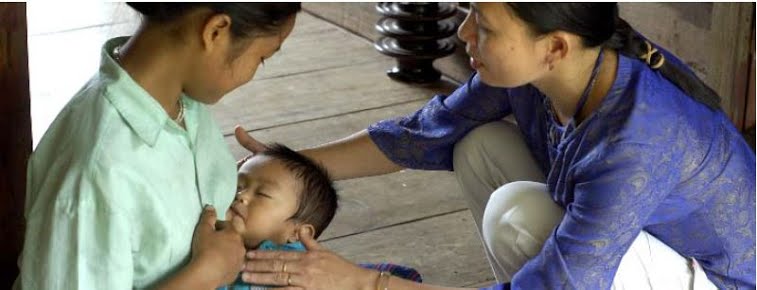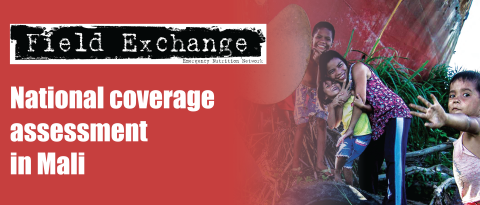Infant and Young Child Feeding in Emergencies (IYCF-E) –Toolkit for implementation
 By Britni Burkhardsmeier (Programme Coordinator, Save the Children USA), Nicki Connell (Emergency Nutrition Advisor, Save the Children USA) and Sarah Butler (Emergency Nutrition Team Leader, Save the Children USA)
By Britni Burkhardsmeier (Programme Coordinator, Save the Children USA), Nicki Connell (Emergency Nutrition Advisor, Save the Children USA) and Sarah Butler (Emergency Nutrition Team Leader, Save the Children USA)
This IYCF-E Toolkit was developed with the help of a grant from the USAID Technical and Operational Performance Support (TOPS) programme in addition to Save the Children’s Innovation, Development, Evaluation and Action (IDEA) Fund. The TOPS Micro Grants Programme is made possible by the generous support and contribution of the American people through the United States Agency for International Development (USAID). The contents of the materials produced through the TOPS Micro Grants Programme do not necessarily reflect the views of TOPS, USAID or the United States Government. The IDEA Fund was established to help drive Save the Children’s signature programmes through investments to test, evaluate and refine those programmes, document results, influence policy and practice, and position effective programmes as “ready to scale.” The IYCF-E training received further support from the Division of Humanitarian Response at SCUS.
Overview of IYCF-E Toolkit
Disruption and displacement of populations in emergency situations greatly impacts the health and nutritional status of infants and young children. Adequate nutrition and care of children has been identified as one of the key factors to promote child health and survival. Consequently, Infant and Young Child Feeding in Emergencies (IYCF-E) support has become a major strategy in reducing child morbidity and mortality during humanitarian emergency responses.
In 2013, Save the Children developed an IYCF-E Toolkit for use by the global community during emergency responses. The aim of the initiative was to provide assistance to field practitioners on creating successful IYCF-E programmes that will work with parents and communities to protect, promote and support safe and appropriate IYCF-E practices. The IYCF-E Toolkit is available online on Save the Children’s Emergency Health and Nutrition external website1. Since being created in 2013, the toolkit has already undergone a modification process in order to make it more user-friendly. In addition, some documents in the Toolkit have been piloted in the Typhoon Haiyan response in the Philippines in 2013-2014. In order to facilitate accessibility, the Core Toolkit has been translated into Arabic, available now on the website, and is currently being translated into French, which will be available early 2015.
The IYCF-E Toolkit consists of three main folders – Core Toolkit, Key Implementation Resources, and References – in the following layout:
- Determine the Need
- Programme Planning
- Caseload and Supply Needs
- Staff
- Orientation and Training
- Proposal Development, Monitoring and Reporting
- Policy
- Coordination and Communications
The Core Toolkit includes all documents considered essential for planning and implementing an IYCF-E response. The Key Implementation Resources include sample job descriptions and supervision checklists. The References include all key guidelines and manuals related to IYCF-E including agency-generated materials (e.g. Concern Worldwide, Action Against Hunger and CARE). The IYCF-E Toolkit was developed in conjunction with Save the Children’s field offices, which shared documents that had already been developed and which were then adapted for application to multiple contexts.
Middle East regional training
Using the same funding from USAID’s TOPS programme and Save the Children USA’s internal funding including the IDEA Fund, Save the Children led a Middle East Regional IYCF-E Training from 28th September – 2nd October, 2014 in Istanbul, Turkey. Save the Children identified the need to deliver IYCF-E training when it became apparent that comprehensive IYCF-E trainings are not common globally, particularly in relation to implementation of IYCF-E programmes. With the IYCF-E Toolkit version 2 recently developed, it was an ideal time to hold a training that also orientated participants to the IYCF-E Toolkit so tools could be put into use effectively. The Middle East was identified as the priority region given the recent IYCF-E challenges specific to the Syria response.
Save the Children, International Medical Corps, World Food Programme, World Vision, Support to Life, International Orthodox Christian Charities and Physicians Across Continents were represented by the fifteen participants who attended the training. Four facilitators provided expertise and instructions throughout the training. Two of these facilitators were from Save the Children (an Emergency Nutrition Advisor and an IYCF-E Advisor), the third facilitator was a Lecturer and Assistant Director of Nursing from the University of Balamand, Lebanon and the fourth facilitator was a Mental Health & Child Care Practices Advisor from ACF. In addition, Save the Children invited two guest speakers: the Save the Children/UNICEF Regional IYCF Advisor and Save the Children Jordan’s Nutrition Coordinator, in order to ensure the training was tailored to the regional context.
The five day training consisted of technical and practical sessions. The technical sessions focused on key IYCF-E areas considered priorities for the Syria response, such as relactation and the use of breastmilk substitutes. Practical sessions focused on a simulated case study response. This structure allowed the participants to strengthen and apply the technical knowledge that they were learning and to provide constructive feedback about the tools in the toolkit.
The training also provided a unique opportunity for the facilitators to learn from the participants about the challenges faced in the Syria response with regard to IYCF. This information was largely gained during the following sessions: Why is IYCF-E Important in the Syria Response; Challenges with IYCF-E in the Syria Response; Myths and Misconceptions and the Panel Discussion on Breastmilk Substitutes. Valuable information was gained and captured from the participants and has since been fed back to the Infant Feeding in Emergencies (IFE) Core Group, in order to widen the evidence base for IYCF programming in the Syria response. Daily feedback from the participants and an evaluation at the end of the training was very positive. The training was useful and informative, participants planned to share information with colleagues and to make adjustments to their IYCF-E interventions as needed. The IYCF-E Toolkit was considered very comprehensive and useful for future IYCF-E responses.
As this was the first IYCF-E training that Save the Children has conducted, there were many lessons learned. The facilitators acknowledge that IYCF-E is a huge technical area and could be a two to three weeks training at least, if all topics are covered. Therefore regional priorities must be identified and the agenda for similar one week, regional trainings should be tailored to the audience with further adaptation based on participant feedback. The sessions matched the layout of the IYCF-E Toolkit, which worked well. The case study simulation was very helpful in building confidence to apply the toolkit.
Future plans
As the toolkit was created in 2013, there are additional updates and modifications that have been identified which need to be incorporated. Therefore, pending further funding, it is recommended that a Version 3 is produced during 2015 in order to update technical aspects in line with recent research. It is also recognised that the IYCF-E Toolkit should be more extensively piloted in additional emergency response settings to confirm that the Toolkit is as relevant, practical and easy to use as was originally intended. To date, some documents in the IYCF-E Toolkit have been used in the Typhoon Haiyan response in the Philippines in 2013-2014 but a comprehensive pilot in multiple settings would strengthen the Toolkit further.
It is intended to roll out further IYCF-E trainings in additional regions and countries where the need is identified. Save the Children is securing funding to do this.
For any comments, questions or to discuss interest in piloting the IYCF-E Toolkit during 2015, please email: iycfetoolkit@savechildren.org
1 ?https://sites.google.com/site/stcehn/documents/iycf-e-toolkit


